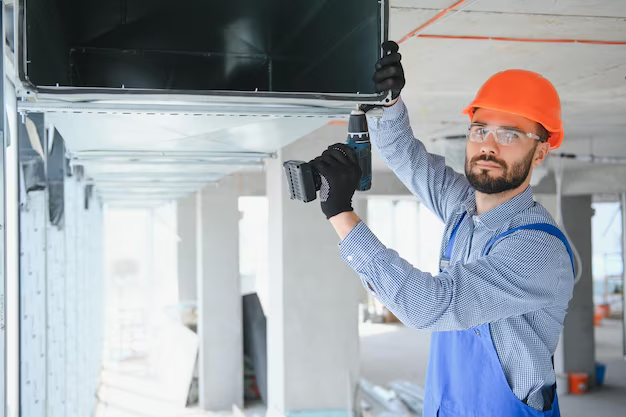Your Guide to How To Properly Maintain Your Home's HVAC System
What You Get:
Free Guide
Free, helpful information about Home Maintenance & Repairs and related How To Properly Maintain Your Home's HVAC System topics.
Helpful Information
Get clear and easy-to-understand details about How To Properly Maintain Your Home's HVAC System topics and resources.
Personalized Offers
Answer a few optional questions to receive offers or information related to Home Maintenance & Repairs. The survey is optional and not required to access your free guide.
Mastering the Art of HVAC Maintenance: Keep Your Home Comfortable Year-Round
Ensuring the optimal performance of your HVAC system is crucial for maintaining comfort in your home, regardless of the season. A well-maintained system not only keeps your living space at the perfect temperature but also saves money on energy bills and extends the life of your equipment. Here’s how you can maintain your HVAC system like a pro.
Regular Inspections and Cleanings
The key to a healthy HVAC system is regular inspection and cleaning. It’s advisable to schedule professional maintenance at least twice a year—typically before the extremes of winter and summer. Here’s what you should focus on:
- Air Filters: Check and replace air filters every 1-3 months. A clean filter improves air quality and system efficiency.
- Outdoor Units: Keep the area around outdoor units free from debris and vegetation to ensure proper airflow.
- Ductwork: Have your ductwork inspected for leaks or blockages, which can impede airflow and efficiency.
- Drains and Pans: Check for clogs or overflow in condensate drains and pans, which can lead to water damage.
Optimize Energy Efficiency
A well-tuned HVAC system can significantly reduce energy consumption. Consider these energy-efficient practices:
- Thermostat Management: Use a programmable thermostat to adjust temperatures based on your schedule, saving energy when you're not home.
- Regular Inspections: Ensure that insulation around ducts and windows is intact to prevent temperature loss.
- Zoning Systems: Invest in zoning systems that allow for temperature control in different areas, optimizing comfort where you need it most.
DIY Maintenance Tips
Taking some maintenance tasks into your own hands can keep costs down and performance up:
- Fan and Vent Cleaning: Dust ceiling fans and air vents regularly to support better airflow.
- Seal Leaks: Use weatherstripping or caulk to seal leaks around windows and doors.
- Flue and Chimney Checks: If your system involves combustion, inspect the flue and chimney annually for safety.
When to Call a Professional
Even with the best DIY maintenance efforts, some issues require professional expertise:
- Strange Noises: Unusual sounds often indicate problems that need immediate attention.
- Electrical Issues: Flickering lights or breaker trips when the HVAC system is on could indicate electrical faults.
- Inconsistent Temperatures: If some rooms are too hot or too cold, it may be time for a system inspection.
Ensuring your HVAC system runs efficiently not only keeps you comfortable but can also help you save on expenses—an important consideration for many households. Besides, unexpected HVAC repairs can sometimes put a strain on finances, but financial assistance programs might help.
Financial and Educational Opportunities 🌟
- 💰 LIHEAP (Low Income Home Energy Assistance Program): Provides financial assistance for low-income households to manage energy bills.
- 🎓 Educational Grants: For those pursuing careers in HVAC maintenance or energy efficiency, scholarships and grants can offset educational costs.
- 💳 Credit Card Solutions: Consider 0% financing offers or balance transfers on credit cards for covering unexpected HVAC repairs.
- 📊 Government Aid Programs: Explore your eligibility for state and federal programs that offer assistance on home energy improvements.
Maintain your HVAC system effectively and explore available resources that can ease financial stress, ensuring your home remains a cozy haven year-round.
What You Get:
Free Home Maintenance & Repairs Guide
Free, helpful information about How To Properly Maintain Your Home's HVAC System and related resources.

Helpful Information
Get clear, easy-to-understand details about How To Properly Maintain Your Home's HVAC System topics.

Optional Personalized Offers
Answer a few optional questions to see offers or information related to Home Maintenance & Repairs. Participation is not required to get your free guide.


Discover More
- Common Electrical Problems And How To Fix Them
- Common Plumbing Issues And How To Fix Them
- DIY Home Repairs Every Homeowner Should Know
- Home Maintenance Tips For First-Time Homeowners
- Home Maintenance Tips For Older Homes
- How To Avoid DIY Home Repair Disasters
- How To Clean And Maintain Your Home's Windows
- How To Extend The Life Of Your Home Appliances
- How To Fix a Leaky Roof
- How To Identify Structural Problems In Your Home
